|
|
|
Sort Order |
|
|
|
Items / Page
|
|
|
|
|
|
|
| Srl | Item |
| 1 |
ID:
082350
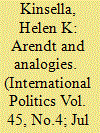

|
|
|
|
|
| Publication |
2008.
|
| Summary/Abstract |
In this essay, I review the argument of Patricia Owens stellar new book, Between War and Politics. Specifically, I engage with, although am skeptical of, her claim that that the current detention camps founded and governed by the United States in the global war on terror are dissimilar to those founded and governed by Germany in the Holocaust
|
|
|
|
|
|
|
|
|
|
|
|
|
|
|
|
| 2 |
ID:
113519
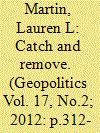

|
|
|
|
|
| Publication |
2012.
|
| Summary/Abstract |
Critical security scholars have argued that biometric identity technologies, databanking, digital surveillance, and risk analysis reveal not a blockaded boundary but a border that follows transboundary migrants as they move within and between national territories. Managed through risk-based technologies, this networked, contingent border respatialises inclusion and exclusion, forming a border that is potentially everywhere and nowhere in particular. At the same time, immigration scholars have shown how immigration authorities deploy policing, inspection, and identification practices both within and beyond territorial boundaries, making life increasingly uncertain for noncitizens. In the US, Immigration and Customs Enforcement's (ICE) authority to detain noncitizens has become a key spatial strategy in domestic counter-terrorism, interior immigration enforcement and border securitisation. Thus, transboundary migration and state responses to it trouble analytic distinctions between domestic and foreign policy, immigration and national security, the border and the interior. This paper builds on recent work in immigration geopolitics to analyse how detention, in particular, works to contain individual migrants and deter future migrants. Focusing on noncitizen family detention, this article situates US noncitizen detention in a broader milieu of pre-9/11 US immigration enforcement law and post-9/11 security practices. I then analyse how detention congeals a number of spatial strategies - remoteness, isolation, spatial ordering, inter-centre transfers, and criminalisation - that work to destabilise migrants' support networks. Modulated with digitised border and identity surveillance technologies, detention foregrounds the persistence of disciplinary tactics in risk-dominated security regimes.
|
|
|
|
|
|
|
|
|
|
|
|
|
|
|
|
| 3 |
ID:
152727
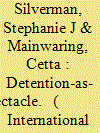

|
|
|
|
|
| Summary/Abstract |
Using a combination of migration studies, political sociology, and policy studies, this paper explores the contradictions and violence of immigration detention, its architectures, and its audiences. The concept of “detention-as-spectacle” is developed to make sense of detention’s hypervisible and obscured manifestations in the European Union. We focus particularly on two case studies, the United Kingdom and Malta, which occupy different geopolitical positions within the EU. Detention-as-spectacle demonstrates that detention is less related to deterrence and security than to displaying sovereign enforcement, control, and power. A central aspect of the sovereign spectacle is detention’s purported ability to order and even halt “crises” of irregular immigration, while simultaneously creating and reinforcing these crises. The paper concludes by examining recent disruptions to the spectacle, and their implications.
|
|
|
|
|
|
|
|
|
|
|
|
|
|
|
|
| 4 |
ID:
165264
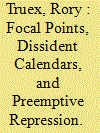

|
|
|
|
|
| Summary/Abstract |
This article explains temporal variation in repression as a function of the “dissident calendar,” the set of events that serve as natural focal points for coordination. The core argument is that regimes can anticipate the events that create these focal points and engage in preemptive repression to survive their passing. This dynamic produces predictable, often cyclical patterns in repression. An analysis of dissident detentions in China from 1998 to 2014 shows that “focal events” alone appear to be responsible for more than 20 percent of dissident detentions over the analysis period. Such detentions tend to be shorter and rely less on formal criminal procedures, suggesting a “catch-and-release” dynamic. Additional analysis of detentions in Tibet shows how the calendar may vary by issue or group.
|
|
|
|
|
|
|
|
|
|
|
|
|
|
|
|
| 5 |
ID:
157723
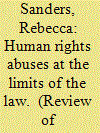

|
|
|
|
|
| Summary/Abstract |
Law following and law breaking are often conceptualised as polar opposites. However, authorities in liberal democracies increasingly deploy a strategy of what I call plausible legality in order to secure immunity and legitimacy for proscribed practices. Rather than ignore or suspend law, they construct legal justifications for human rights abuses and other dubious policies, obscuring the distinction between legal compliance and non-compliance. I argue this is possible because instabilities in legal rules make them vulnerable to manipulation and exploitation. By tracing American rationales for contentious ‘enhanced interrogation techniques’, indefinite detention, and ‘targeted killing’ practices in the ‘Global War on Terror’, I show that law need not always be abandoned or radically reconstituted to achieve troubling ends and that rule structures enable certain patterns of violation while limiting others. The international prohibition on torture is robust and universal, but provides vague definitions open to interpretation. Detention and lethal targeting regulations are jurisdictionally layered and contextually complex, creating loopholes and gaps. The article concludes by reflecting on implications for the protection of human rights. While law is not wholly indeterminate, human rights advocates must constantly advocate shared legal understandings that constrain state violence.
|
|
|
|
|
|
|
|
|
|
|
|
|
|
|
|
| 6 |
ID:
162662
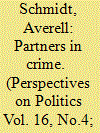

|
|
|
|
|
| Summary/Abstract |
In the years following the attacks of 9/11, the CIA adopted a program involving the capture, extraordinary rendition, secret detention, and harsh interrogation of suspected terrorists in the war on terror. As the details of this program have become public, a heated debate has ensued, focusing narrowly on whether or not this program “worked” by disrupting terror plots and saving American lives. By embracing such a narrow view of the program’s efficacy, this debate has failed to take into account the broader consequences of the CIA program. We move beyond current debates by evaluating the impact of the CIA program on the human rights practices of other states. We show that collaboration in the CIA program is associated with a worsening in the human rights practices of authoritarian countries. This finding illustrates how states learn from and influence one another through covert security cooperation and the importance of democratic institutions in mitigating the adverse consequences of the CIA program. This finding also underscores why a broad perspective is critical when assessing the consequences of counterterrorism policies.
|
|
|
|
|
|
|
|
|
|
|
|
|
|
|
|
| 7 |
ID:
174254
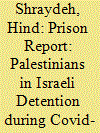

|
|
|
|
|
| Summary/Abstract |
This first-person account, written by the partner of a Palestinian prisoner, brings to life detention conditions in Israeli prisons that have been well documented by human rights and other organizations. It highlights the particular dangers these carceral facilities pose to the men, women, and children being held—many in so-called administrative detention, without trial or charge—during the Covid-19 pandemic. Part reportage and part cri de coeur, this testimonial touches on the most immediate and existential aspects of imprisonment for Palestinians in Israeli prisons: poor sanitary conditions and insufficiency of Covid-19 mitigation measures, as well as systemic medical negligence, such as the withholding of medical care at a time of heightened threat and greater vulnerability.
|
|
|
|
|
|
|
|
|
|
|
|
|
|
|
|
| 8 |
ID:
186814
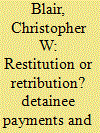

|
|
|
|
|
| Summary/Abstract |
Counterinsurgents frequently rely on mass arrests to impede rebel operations, but in so doing, risk detaining innocent civilians. Wrongful detention can backfire, fueling insurgent violence by alienating detainees and their kin. Can counterinsurgents mitigate wrongful detention through targeted compensation? I study this question using project-level data on US payments to individuals deemed innocent and released from Coalition custody in Iraq between 2004 and 2008. Leveraging plausibly exogenous variation in the allocation of detainee release payments, I document a robust, negative association between counterinsurgent compensation for wrongful detention and insurgent violence. The violence-reducing effects of detainee release payments were greatest in Sunni and mixed sectarian areas; for the types of insurgent attacks, most prone to civilian informing; and when detainee release was complemented by other population-centric reforms. These results suggest that post-harm mitigation helps shift civilian perceptions, inducing civilians to share more information with counterinsurgent forces.
|
|
|
|
|
|
|
|
|
|
|
|
|
|
|
|
| 9 |
ID:
080895
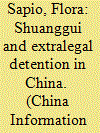

|
|
|
|
|
| Publication |
2008.
|
| Summary/Abstract |
This study on detention fills a gap in scholarship on China's criminal justice system. This article describes shuanggui, a form of detention used on Party members. It traces the historical legacies linking shuanggui to forms of detention practiced in imperial China and in Chinese Communist Soviets. The article then moves on to describe the birth of shuanggui and the evolution of norms regulating it. Finally, it points out how shuanggui is being regularized and institutionalized. This process is leading towards its gradual abolition or amelioration. On the other hand, it reflects the continuing evolution and sophistication of the power of the Chinese party-state
|
|
|
|
|
|
|
|
|
|
|
|
|
|
|
|
| 10 |
ID:
119276
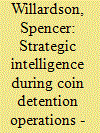

|
|
|
|
|
| Publication |
2013.
|
| Summary/Abstract |
One aspect of the global "War on Terror" that has received limited coverage in the academic literature is the problem of detained persons as it relates to intelligence. This is a surprising oversight, given the number of detainees that the USA has been responsible for (over 25,000 were in custody in Iraq alone at one time during its peak). The detention environment offers a prime strategic intelligence opportunity for the US intelligence community to study the tactics and organizations of individuals who have been removed from the overall conflict. In this article an easily implemented collection program is recommended to be deployed in US/coalition detention centers. The primary recommendation is to gather relational data on detainee communication, both authorized and illicit, and to use these data to perform network analyses of terrorist groups and their individual members.
|
|
|
|
|
|
|
|
|
|
|
|
|
|
|
|
| 11 |
ID:
127978
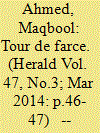

|
|
|
| 12 |
ID:
171906
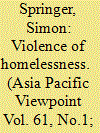

|
|
|
|
|
| Summary/Abstract |
This article examines the plight of homeless peoples in Phnom Penh, Cambodia as a consequence of their enmeshment in a new logic of urban governance being rolled out by city officials and municipal planners. The widespread adoption of neoliberal economics has resulted in a globalised version of urban entrepreneurialism, to which Phnom Penh is a participant. The (re)production of enterprise zones, cultural spectacles, waterfront development, and privatised forms of local governance all reflect the powerful disciplinary effects of interurban competition as cities aggressively engage in mutually destructive place‐marketing policies. Against this neoliberal backdrop, the ongoing pattern of violence utilised by municipal authorities against homeless peoples in Phnom Penh is part of a gentrifying process that the local government has dubbed a ‘beautification’ agenda. Of particular concern is how city officials have begun actively promoting the criminalization of the urban homeless and poor through arbitrary arrests and illegal detention, holding them in so‐called re‐education or ‘rehabilitation’ centres. Yet these centres are not what they seem. Such euphemisms attempt to mask the systemic abuse of marginalised peoples who are deemed to present Phnom Penh in a negative light and are consequently unwanted on the streets of the capital city.
|
|
|
|
|
|
|
|
|
|
|
|
|
|
|
|
|
|
|
|
|